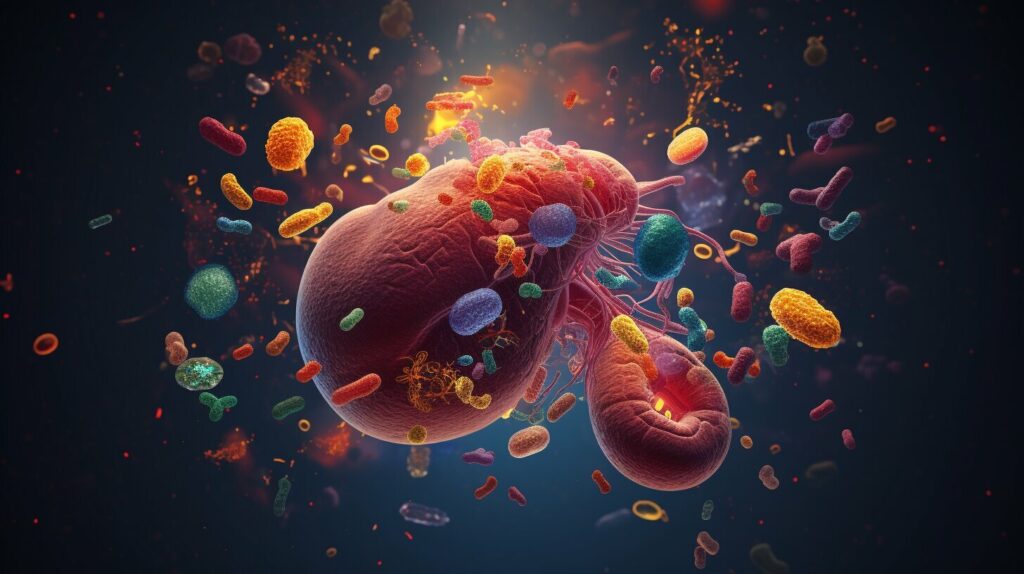If you’re considering incorporating digestive enzymes into your diet, you may be wondering how long it will take for them to start working. The answer may depend on a variety of factors, including the specific enzymes you’re taking, your individual digestive system, and the type of food you’re consuming.
Digestive enzymes are natural substances that help break down the food you eat so your body can absorb the nutrients it needs. They are produced by various organs in the digestive system, including the pancreas and small intestine, and are essential for proper digestion and overall digestive health.
So, how long does it take for digestive enzymes to work? The onset of action can vary, but typically, enzymes will start working within 30 minutes of entering the digestive system. Some enzymes may work more quickly, while others may take longer to take effect.
It’s important to note that the effectiveness of digestive enzymes can depend on several factors, including enzyme supplementation, proper functioning of the digestive system, and individual variations in digestive enzyme efficacy. We’ll explore these factors and more throughout this article to help you better understand how digestive enzymes work and how to optimize their function for better digestion and optimal digestive health.
Key Takeaways:
- Digestive enzymes are natural substances that help break down the food you eat for absorption of nutrients.
- Enzymes typically start working within 30 minutes of entering the digestive system.
- The effectiveness of digestive enzymes can depend on various factors, including enzyme supplementation and individual variations in efficacy.
Understanding Digestive Enzymes and Their Role in the Digestion Process
Before we dive into how long it takes for digestive enzymes to work, it’s important to understand what digestive enzymes are and what role they play in the digestion process.
Digestive enzymes are proteins that break down large food molecules into smaller ones that can be easily absorbed by the body. These enzymes are produced in various organs throughout the digestive system, including the mouth, stomach, pancreas, and small intestine.
The different types of digestive enzymes target specific components of food, such as carbohydrates, proteins, and fats. For example, amylase breaks down carbohydrates, while protease breaks down proteins.
Without these enzymes, our bodies would have a difficult time breaking down food and absorbing the necessary nutrients for optimal health and function.
In addition to aiding in the digestion process, digestive enzymes also play a crucial role in maintaining overall digestive health. They help prevent common digestive issues such as bloating, gas, and indigestion, and can also alleviate symptoms associated with more serious digestive conditions.
Now that we’ve covered the basics, let’s take a closer look at how digestive enzyme function can be influenced and their efficiency impacted.

Factors Affecting the Efficiency of Digestive Enzymes
While digestive enzymes play a crucial role in the digestion process, their effectiveness can be influenced by various factors. Understanding these factors can help you optimize your digestive health and ensure that you are getting the most out of your enzyme supplementation if you choose to use it.
One important factor to consider is the quality and source of your digestive enzymes. Not all enzyme supplements are created equal, and some may be more effective than others. Look for products that are specifically designed to support digestive health and contain a variety of enzymes that can target different types of food.
| Factor | Description |
|---|---|
| Stomach Acid | Low levels of stomach acid can impair the activation of digestive enzymes, leading to reduced enzyme activity and impaired digestion. |
| Food Intake | Digestive enzyme activity can be influenced by the type and amount of food consumed. Eating a large meal or foods with low enzyme content can increase the demand for digestive enzymes and potentially reduce their effectiveness. |
| Gut Health | An unhealthy gut environment can impair enzyme activity and decrease the absorption of nutrients. Improving gut health through diet and lifestyle changes can help optimize enzyme function and overall digestive health. |
In addition to these factors, enzyme supplementation can also impact their effectiveness. When using digestive enzyme supplements, it is important to take them as directed and with the appropriate dosage to avoid overloading the digestive system and potentially reducing their efficiency in the long run.
Overall, understanding the various factors that can influence digestive enzyme function can help you optimize your digestive health and ensure that you are getting the most out of your enzyme supplementation. Keep these factors in mind as you incorporate digestive enzymes into your diet and lifestyle, and consult a healthcare professional if you have any concerns or questions.

Onset of Action: How Long Does it Take for Digestive Enzymes to Work?
When it comes to the question of how long it takes for digestive enzymes to start working, the answer is not always straightforward. It can depend on several factors, including the type and amount of food you have consumed, the specific digestive enzymes in your supplement, and your individual body chemistry.
Generally, digestive enzymes usually begin working within 30 minutes to an hour after ingestion. This is because they need to reach your small intestine, where most of the digestive process takes place. However, keep in mind that some supplements may have a delayed-release mechanism that allows for more gradual enzyme release over time. In this case, it may take longer for the enzymes to start working.
It’s also important to note that digestive enzymes are not a quick fix for digestive issues. While they can help alleviate symptoms such as bloating, gas, and indigestion, they should not be relied upon as a substitute for healthy eating habits and lifestyle choices.
Ultimately, the time it takes for digestive enzymes to start working can vary from person to person. If you have any concerns about the effectiveness of your supplement, it’s always best to consult with a healthcare professional for guidance and personalized recommendations.

Individual Variations and Digestive Enzyme Efficacy
It is important to note that the efficacy of digestive enzymes can vary from person to person. Several factors can impact the effectiveness of these enzymes, including age, health status, and genetics.
For example, as we age, our bodies may produce fewer digestive enzymes, which can impact digestion and overall nutrient absorption. Health conditions such as inflammatory bowel disease or celiac disease may also affect enzyme production and function.
Genetics may also play a role in enzyme efficacy. Some individuals may naturally produce lower levels of certain enzymes, such as lactase, making it more difficult to digest certain foods.
Understanding these individual variations is important when considering the use of digestive enzyme supplementation or other strategies for optimizing digestion.

It is always recommended to consult with a healthcare professional before making any changes to your diet or supplement regimen. They can help assess your specific needs and make personalized recommendations for improving digestive health and optimizing enzyme function.
Optimizing Digestive Enzyme Function for Better Digestion
If you’re looking to optimize your digestive enzyme function for better digestion, there are several strategies you can try. Here are a few tips to get you started:
- Eat a varied diet: Consuming a variety of foods can help ensure you’re getting the full spectrum of digestive enzymes needed for optimal digestion.
- Chew your food thoroughly: Chewing your food thoroughly breaks down the food into smaller particles, making it easier for the enzymes to do their job.
- Avoid overeating: Eating too much at once can overwhelm the digestive system, making it more difficult for enzymes to effectively break down food.
- Consider enzyme supplementation: Enzyme supplementation may be beneficial for those with digestive issues or those who want to optimize their digestion.
In addition to these strategies, it’s important to maintain a healthy lifestyle overall. Regular exercise, stress management, and adequate sleep can all contribute to better digestive health.
| Tip: | If you’re considering enzyme supplementation, be sure to choose a high-quality product from a reputable company and consult with a healthcare professional for guidance. |
|---|
By implementing these strategies and taking steps to support your overall digestive health, you can help optimize your enzyme function and promote better digestion.

Potential Benefits and Risks of Digestive Enzyme Supplementation
If you’re considering taking digestive enzyme supplements, it’s important to understand their potential benefits and risks.
Potential Benefits
Digestive enzyme supplementation may offer several benefits for those experiencing digestive issues. They can improve nutrient absorption, reduce bloating, gas, and indigestion, and aid in weight loss. Digestive enzymes may also be helpful for individuals with food intolerances or sensitivities.
Additionally, digestive enzyme supplements may provide relief for those with certain medical conditions, such as pancreatitis or cystic fibrosis, which can interfere with the natural production of enzymes in the body.
Potential Risks
While digestive enzyme supplements are generally safe, they can pose risks for some individuals. Taking too many enzymes or taking them for an extended period may cause irritation or inflammation of the digestive tract.
Those with allergies or sensitivities to certain enzymes, or with a history of bleeding disorders, should also exercise caution when taking digestive enzyme supplements.
Furthermore, as with any supplement, it’s important to only purchase from reputable sources and consult with a healthcare professional before starting any new regimen.

Overall, digestive enzyme supplements may be a useful tool in addressing digestive issues and improving overall health. However, it’s crucial to weigh the potential benefits and risks and consult with a healthcare professional before incorporating them into your diet.
Consulting a Healthcare Professional for Digestive Enzyme Guidance
It is important to note that while digestive enzymes can certainly be beneficial for many individuals, they may not be suitable for everyone, and it is always best to consult with a healthcare professional before incorporating them into your diet.
Your healthcare provider can help determine if digestive enzyme supplementation is appropriate for your specific needs based on factors such as your overall health, medical history, and any underlying digestive issues or conditions you may have.
They can also help you identify the best types of enzymes and dosages for your needs, as well as potential interactions with any medications you may be taking.
Additionally, if you are experiencing chronic digestive issues such as bloating, gas, or abdominal pain, your healthcare provider can perform a thorough evaluation to determine the root cause of your symptoms and recommend a personalized treatment plan that may include digestive enzymes, dietary changes, medications, or other interventions as needed.
Ultimately, consulting with a healthcare professional is the best way to ensure that you are using digestive enzymes safely and effectively to promote optimal digestive health.

Conclusion
After exploring the factors that affect the efficiency of digestive enzymes, it is clear that the time it takes for these enzymes to start working can vary depending on individual circumstances. However, in general, it typically takes between 30-60 minutes for digestive enzymes to begin working in the digestive system.
In addition to understanding how long it takes for digestive enzymes to take effect, it is important to optimize their function for better digestion and overall digestive health. This can be achieved through a variety of strategies, including proper diet, enzyme supplementation, and consultation with a healthcare professional to address any underlying digestive issues.
Remember to Consult with a Healthcare Professional
While digestive enzyme supplementation can be beneficial for some individuals, it is important to consult with a healthcare professional before incorporating it into your diet. This is particularly important if you have underlying digestive issues or a medical condition that affects digestion.
Your healthcare provider can help you determine the best course of action for optimizing your digestive enzyme function and promoting overall digestive health.
FAQ
Q: How long does it take for digestive enzymes to work?
A: The time it takes for digestive enzymes to start working can vary depending on various factors such as the individual’s digestive health and the type of enzymes being used. Generally, digestive enzymes can begin to take effect within 30 minutes to an hour after consumption.
Q: What are digestive enzymes and their role in the digestion process?
A: Digestive enzymes are proteins produced by the body that help break down food into smaller, more easily absorbed molecules. They play a crucial role in the digestion process by facilitating the breakdown of complex nutrients into simpler forms that can be utilized by the body.
Q: What factors can affect the efficiency of digestive enzymes?
A: Several factors can influence the effectiveness of digestive enzymes, including the use of enzyme supplementation and the proper functioning of these enzymes in the digestive system. Additionally, individual variations in digestive enzyme production and activity can impact their efficacy.
Q: How long does it take for digestive enzymes to start working?
A: The onset of action for digestive enzymes can vary, but typically they start working within 30 minutes to an hour after consumption. However, it’s important to note that individual responses may vary, and some individuals may experience faster or slower results.
Q: Are there individual variations in digestive enzyme efficacy?
A: Yes, individual variations in digestive enzyme production and activity can impact their efficacy. Factors such as age, overall health, and underlying medical conditions can influence the effectiveness of digestive enzymes in different individuals.
Q: How can one optimize digestive enzyme function for better digestion?
A: To optimize digestive enzyme function and promote better digestion, it is important to maintain a healthy diet rich in nutrients, stay hydrated, manage stress levels, and consider lifestyle factors that can impact digestion, such as regular physical activity and adequate sleep.
Q: What are the potential benefits and risks of digestive enzyme supplementation?
A: Digestive enzyme supplementation can have potential benefits, including improved digestion, nutrient absorption, and relief from digestive discomfort. However, it may also carry some risks or side effects, such as allergic reactions or interactions with certain medications. It is advisable to consult a healthcare professional before starting any supplementation.
Q: Why is it important to consult a healthcare professional for digestive enzyme guidance?
A: Consulting a healthcare professional is crucial for personalized guidance on incorporating digestive enzymes into one’s diet and addressing any underlying digestive issues. They can assess individual needs, recommend appropriate products or dosages, and ensure safe and effective use.
Q: In conclusion, how long does it take for digestive enzymes to work?
A: The time it takes for digestive enzymes to work can vary, but typically they start taking effect within 30 minutes to an hour after consumption. However, it is important to consider individual variations, digestive health, and the factors influencing their efficiency.














